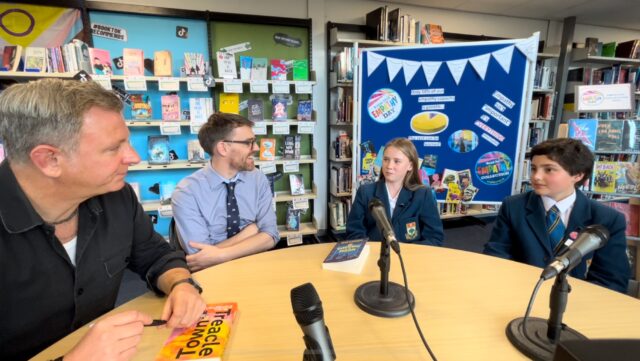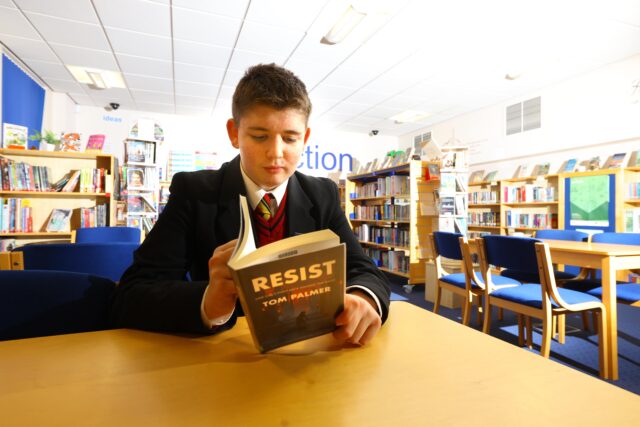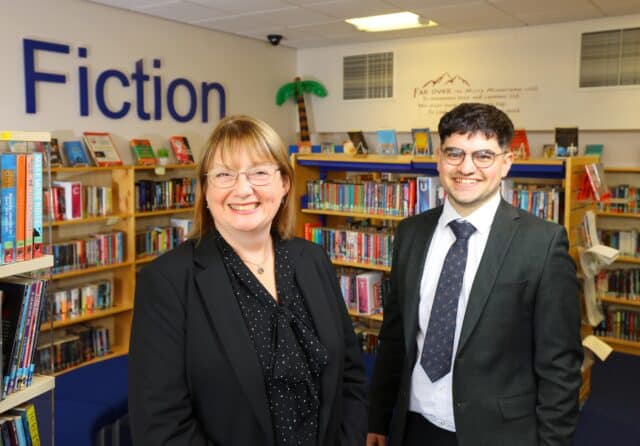Blog
The books we read shape the people we become

Dr Graham Fairweather
Senior School Librarian, The High School of Glasgow
Read the blog
This Term, we became the first independent school in Scotland to achieve Gold in Scottish Book Trust’s national ‘Reading Schools’ programme. This scheme, developed by Scottish Book Trust, Scotland’s national charity to transform lives through reading and writing, has three accreditation levels – Core, Silver and Gold – that mark a school’s journey to building a successful and sustainable reading culture within their school and local community.

Reading Schools is open to every school in Scotland and its framework is tied to the delivery of the Curriculum for Excellence. It is built upon extensive research that shows the significant benefits for young people who read for pleasure, which has been shown to improve attainment, support equity and wellbeing, and help develop critical thinking, creativity and empathy skills – I’d urge all Scottish schools to get involved. To be accredited, schools need to evidence how a focus on reading for pleasure has sustainably benefitted the school in different ways, including impact on learner achievements, learner opportunities and role-modelling, staff development, raising the profile of reading with families and developing partnerships beyond their own school.
Achieving this standard has been a concerted effort from across the whole school to create a culture of reading, but at the heart of the journey has been our busy and vibrant Senior School Library. It is a place where pupils choose to spend time and where everyone has the opportunity to become a reader, be that of books, graphic novels or magazines. Fundamentally, it’s about ensuring there is something for everyone, igniting curiosity and empowering children to make decisions about the sort of place our library is.

Pupil voice is integral to developing our library collection and I collaborate with a large pupil working group on various reading-based initiatives and clubs to create a modern reading culture in the school. Our most successful club ‘Books and Biscuits’ is a weekly chance for all pupils to enjoy some light-hearted book-based fun. The principal is that it is accessible to all, regardless of ability, and encourages children to self-identify as readers.
I’ve particularly valued the community aspects of our reading journey, which have included hosting our own in-house book festival featuring a number of author talks and book signings, manning a storytelling tent at a school fete, a ‘Rights Respecting Reads’ challenge that is also open to staff and families and a beautiful partnership with a local care home where pupils spent time reading with residents.
Another key partnership has been working with EmpathyLab, a charitable social enterprise that uses books to inspire an empathy-educated generation. Pupils used their ‘Read for Empathy Collection’ on several interdisciplinary projects and even had the opportunity to interview Brian Conaghan, Reading Schools Ambassador for secondary schools, for an #EmpathyActionMonth recording that was used by schools across the UK.

Recognising this Reading Schools achievement within the context in which we are operating reveals sobering truths. The National Literacy Trust’s recent Annual Literacy Survey revealed the number of children and young people aged between 5 and 18 who said they enjoyed reading is at its lowest since they first started asking this question in 2005, with two in three children and young people aged 8 to 18 saying they don’t enjoy reading in their free time.
With so many devices competing for children’s attention, books are being relegated in favour of activities requiring less effort, such as, watching TV, online gaming or scrolling social media. However, reading for pleasure is a critical skill for all of us, and is vital for children and young people. Building a daily reading habit has so many benefits beyond the obvious improvements in literacy, with benefits such as fostering feelings of ease, happiness and confidence. Not to mention, the chance to step into someone else’s shoes and see the world through other lenses, to learn about new cultures and gain a truer sense of self. It is so important both in school, and at home, that we are encouraging this generation to make reading a daily practice. However, it is clear there are a number of barriers to entry for many children across the country and charities like Scottish Book Trust and the National Literacy Trust are working hard to ensure all children and families have access to books and libraries.
The books we read shape the people we become. That children at the High School are bucking the reading trends seen nationally is heartening for us, but ultimately, it is society that suffers when youngsters grow up without the joy of books, strong literacy skills, and all the associated benefits. My main piece of advice: get reading, share your joy and give children the autonomy to start wherever they feel comfortable – without judgement – you just never know where this will take them.



